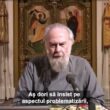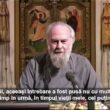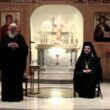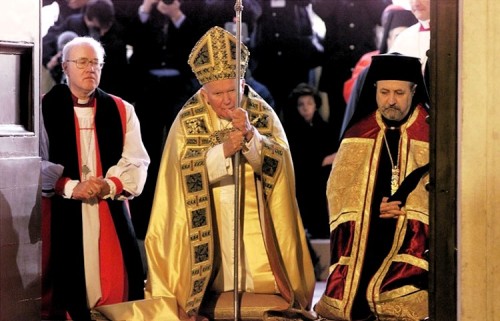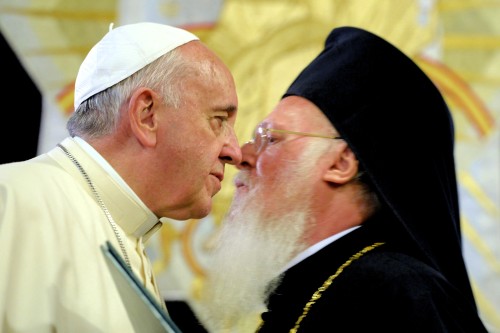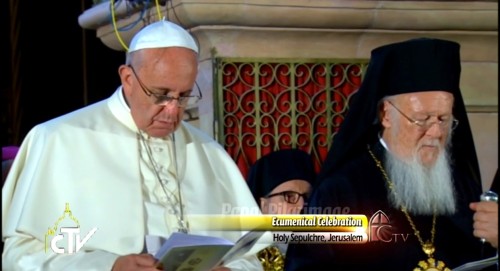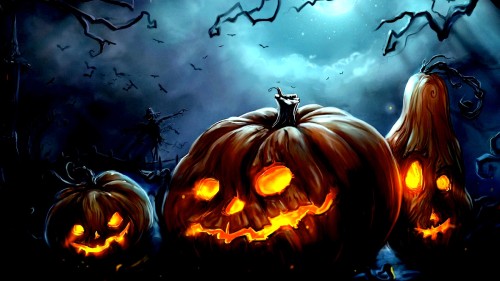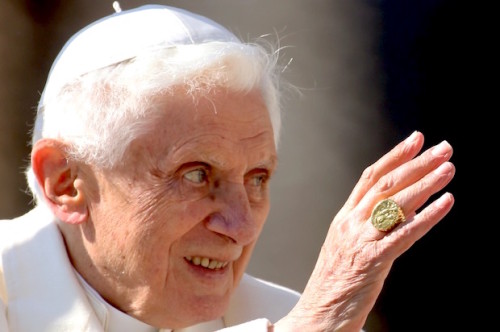“What does Danion want with all these? Am I not aware myself that I have eyes and ears?” Brother, If you’d understood how wonderful man was created, I would not have told you these things as if speaking to a little child. The man you describe, who has paranormal powers, is different from the man I describe to you. You write to me about the man whose goal is to become super-human, a kind of semi-god. I write to you about the man whose goal is to become deified. Your “saint” has all kinds of mysterious powers. My saint only has love, humbleness, prayer and struggle, but he is impregnated with divine energies and undeniably superior to any human creature.
Let me finish what I started: if man created by God had walked the path of obedience, he would have never known sorrow, sin or evil. But Adam “took benefit” of the great gift of freedom and chose the path of death. And all his successors inherited the seal of his fall. The Son of God became human to raise man from death. He incarnated, lived among humans, preached to them the path of salvation and for this he suffered death on a cross. He rose from the dead, trampling down death by death, so that all those lying in the grave of sin become dead for death and live the true life. The human nature was too weak and it was not enough for men to know which things they should do and which things they shouldn’t. Otherwise, it would not have been necessary for Christ to incarnate anymore but it would have been enough for Him to send a new prophet, like the prophets of times ago, a prophet who would have preached himself the truths of Christian belief. But people needed much more to change their life. That is why the Church was born and appeared as a school of salvation, if I’m allowed to call it like that. The Holy Apostles were chosen to baptize the nations, to share the sanctifying grace to the people and bring Christ among them, to watch over the speaking herd so that it lived a holy life and to protect it from errors. You ask: why are the priests sinners? If the Church is good, why does it have bad servants? If God could create a Church where all the servants were holy, do you think he would not have done it? Let’s take into account that God chose priests among people like us, and if we are sinners, the priests are found at our level (not to mention that there are plenty of priests full of the grace of the Holy Spirit.) God wanted indeed a church whose servants – and not only, but its believers as well – are saints. But the answer from the people’s side was not according to expectations.
Knowing the weakness of our human nature, God ordained the Church in such a manner that the salvation of believers is not exclusively related to the holiness of its servants. If the salvation of the herd depended only on the holiness of its shepherds, than hell would be overcrowded since a long time. But no matter of their worthiness or unworthiness, the shepherds are invested with the power to perform the Holy Sacraments, to baptize, to forgive sins, to celebrate the Liturgy. And even if some shepherds end up in hell for some of their sins, still their herd might end up in heaven. I do not deny the important role the shepherd has when he represents a model for his herd, I only want to explain that the salvation of believers does not depend on the sinfulness of the priest. Saint John Chrysostom says: “has a priest fallen into adultery? His sin is then the top of all sins.” But no matter how sinful a priest is, till the moment when he is excommunicated or “tastes” the apple of heresy, he still has the power to do the Holy Sacraments. (Maybe you are anxious to read about reincarnation or things like that. That is what I’m doing now, I am trying to explain why the teaching of the Church is true.)
The Holy Tradition asserts that it is enough for the priest to keep the right-faith in order for his herd to walk the path of salvation. Our faith is not invented by human mind. The Holy Scripture and Holy Tradition are its grounds. The dogmatic teaching of the Church is defined by the Ecumenical Synods, where the Holy Spirit enlightens the hierarchs and they establish the rules for the norms of faith. An ecumenical synod cannot make mistakes precisely because it’s not the people who make decisions but the Holy Spirit Who enlightens them. One of the criteria that show that a Synod is Ecumenical is the fact that it does not contradict any of the previous Synods and that the Body of the Church – both the clergy and laymen – receives its teachings. This is the great gift of the Church: that its teachings of faith are not human inventions, but truths inspired by the Holy Spirit. A Byzantine emperor, the wise Leon, said: “I receive the Seven Holy Ecumenical Synods as the Holy Scripture.” And a saint, Nicodemus the Athonite, strongly stated “he who is against the Holy Ecumenical Synods is against the Holy Spirit, Who speaks through the Ecumenical Synods, and becomes a heretic and falls under the punishment of anathema.” Here is the entire Christian philosophy: if you want to be a son of Christ – then you have to believe that He is the Son of God and to become part of His mystical Body, meaning the Church. And if you want to become part of the Church then you have to accept that all its teachings are true. He who deliberately accepts all the teachings of the Church except one (like for instance the virginity of the Holy Theotokos, or the falsity of apokatastasis, or life after death), is excluded from the Church. He could be a faster, or a man of prayer, or poor people loving, but surely he is not a Christian. He is even under the anathema of the Church. I don’t know how I could have answered your letter if you did not mention your conviction that you were an Orthodox Christian. Actually this was the most important reason I wrote to you – the hope that you would understand what it means to be an Orthodox (which you actually believe you are) and that you would unite with the true Church.
One of the most frequently asked questions is the following: how do I know which is the true Church? The true Church is the one that preserved the teachings of Christ our Savior and of the Holy Apostles unaltered. What can we say about protestants and neo-protestants? They wanted to restore the Church of the first centuries and gave up the entire Holy Tradition. They were only interested in the Holy Scripture and gave up all Apostolic teachings. Therefore how could the Christians who died before the writings of the first books of the New Testament be saved? What did they use for their guidance if they did not have the Scripture? They had the Holy Apostles and their successors. The Holy Scripture belongs to the Church. The Church has its copyright, so to say. The Holy Tradition is the dictionary used to understand the Holy Scripture. The Catholics are far away from the truth they believed in for a thousand years. If at the second Ecumenical Synod both the Fathers of East and West decided that whoever changes the Creed is under the punishment of anathema and then the Catholics changed the Creed, no one can release them from this sin. Even if all the orthodox hierarchs gather to “release” the Catholics from this sin, forgiveness has no value as long as they do not return to the right teaching. In the Orthodox faith there is no theological innovation; on the contrary, the Holy Tradition was faithfully preserved. The apostolic succession does not only mean passing the grace of ordination from the Holy Apostles to bishops and from bishops to their successors and so on up to nowadays (the Catholics have this as well). The Apostolic succession implies the preservation of the teachings of the antecedents: and this was fully preserved only in the Orthodox Church.

